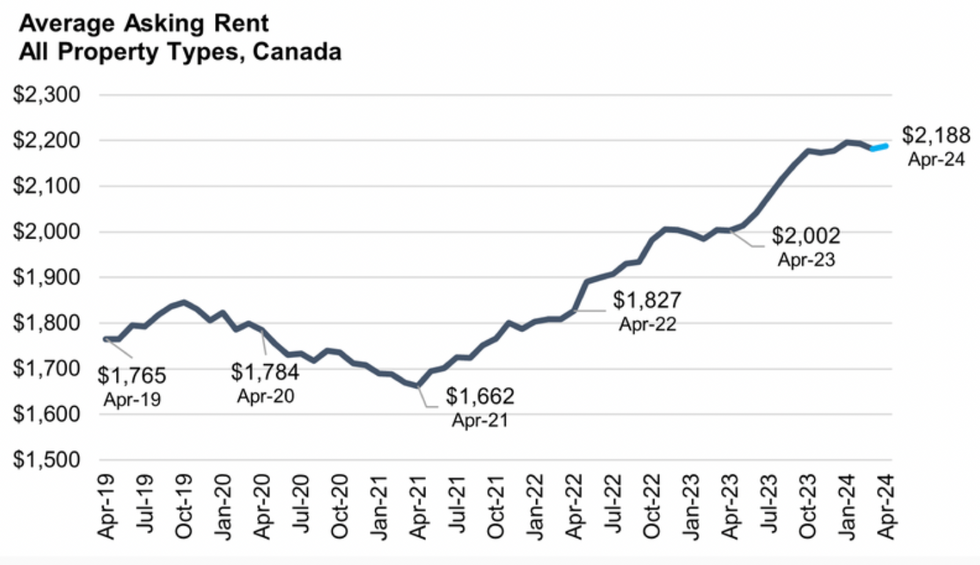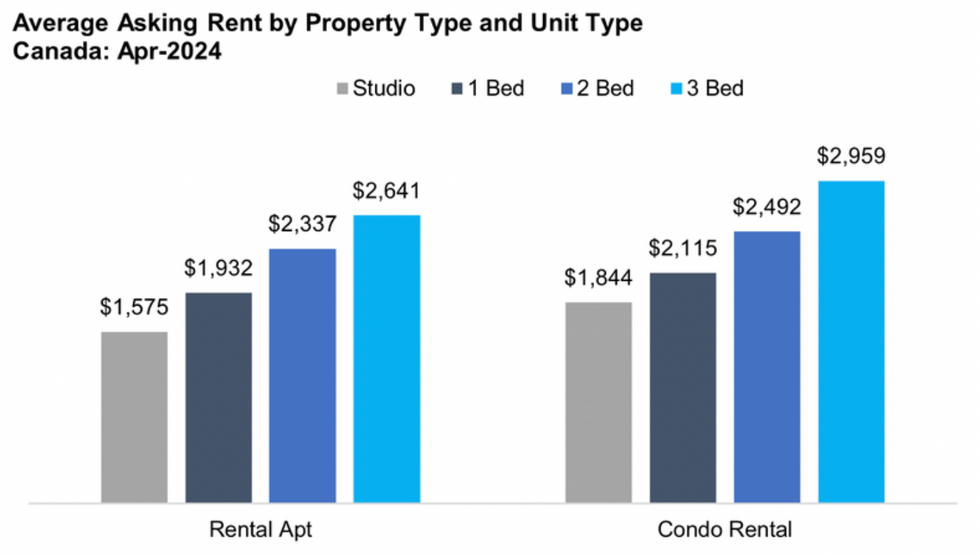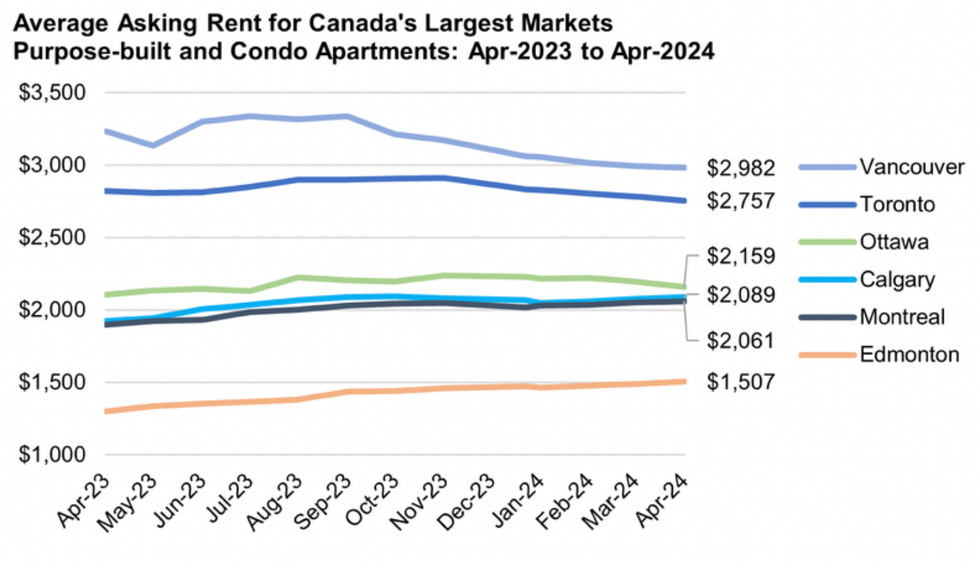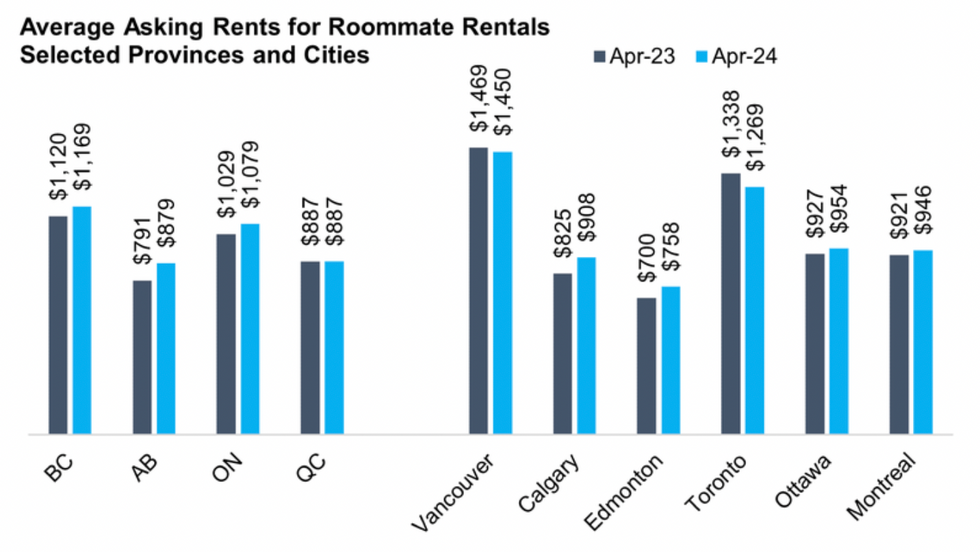Average Canadian rent continued to chug steadily upwards last month — something we’ve more or less come to expect from the segment as would-be homeowners hold out for interest rate cuts, leaving the rental market to soak up that demand.
According to the latest national rent report from Rentals.ca and Urbanation, the monthly asking average across all residential property types clocked in at $2,188 in April, marking a ‘near-record high,’ as well as a 9.3% increase year over year and a 0.3% uptick month over month. The month-over-month increase in particular represented “the first monthly increase in rents since January 2024.”
“However, rents were down slightly by 0.4% over the past three months, illustrating an ongoing moderation in rent growth following the sharp acceleration that occurred during the spring and summer of 2023,” Friday's report also says.

Still, when you compare April 2024 to the “COVID-19 low” of April 2021, Canadian rent has shot up by a staggering 32%, or by an additional $526 per month.
The report highlights that there was significant nuance between average purpose-built rental and condo rents, with the former spiking 13.1% to $2,124, and the latter edging up just 3.8% to $2,331.
With affordability still remarkably pressed across the country — thank you so much, inflation — it was the smaller and (relatively) more affordable units that saw the greatest price appreciation in April. Namely: purpose-built studios, rents for which saw a steep, 17.2% rise to an average of $1,575.

Rental Market “Increasingly Fragmented”
In his analysis of Friday’s data, Urbanation President Shaun Hildebrand remarks that “the rental market in Canada has become increasingly fragmented, with expensive cities seeing rents soften and affordable markets experiencing a continued rapid escalation.” (This is something Hildebrand has drawn attention to in past reports as well.)
“Without a sufficient supply response, those affordable markets are at risk of quickly becoming unaffordable, leaving renters nowhere to turn,” Hildebrand adds.
As Hildebrand alludes to, average asking rents for apartments continued to slip in April in Canada’s major rental markets: Toronto and Vancouver.

In Toronto, rents fell 2.3% year over year and 0.9% month over month to an average of $2,757, continuing a trend that began in September 2023. In a similar fashion, rents in Vancouver dipped 7.8% year over year and 0.4% month over month to an average of $2,982.
“Apartment rents in Toronto have declined 5.4% from their peak in November 2023 ($2,913), while Vancouver rents have fallen 10.7% since reaching their high in July 2023 ($3,340),” the report also notes.
Meanwhile in Edmonton — a major Canadian city that has historically been known to be affordable for renters — rents surged 13.3% annually to an average of $1,507. In Calgary, the annual pace of rent growth clocked in at 8.6%, putting the average rate at $2,089. In Ottawa and Montreal, rents were up 2.5% and 8.6%, respectively, in the month.

Similar trends were observed on the roommate rent front last month, with Toronto seeing a 5% year-over-year decline for shared accommodations, putting the average at $1,269. In Vancouver, those same two metrics came in at 1% and $1,450, respectively. By comparison, roommate rents in Calgary jumped up 10%, while Edmonton, Ottawa, and Montreal saw increases of 8%, 3%, and 3% year over year.
Nonetheless, asking rents for shared accommodations managed a 9% annual uptick across the four provinces tracked for this type of rental — Ontario, British Columbia, Alberta, and Quebec — to an average of $996 per month.




















